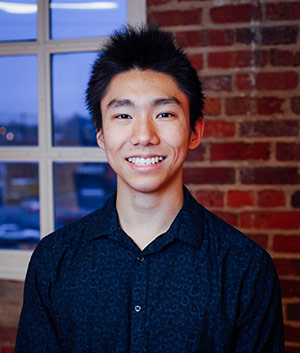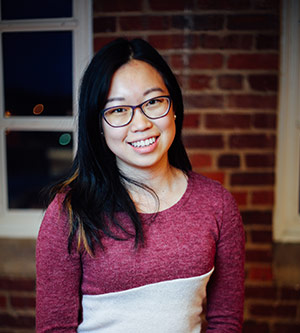Student Entrepreneurs Pitch for Funding at Melissa & Doug Demo Day

After boarding a flight at RDU, senior Judy Zhu greeted her fellow classmates through the plane’s PA system. “Welcome Melissa & Doug fellows,” she said. “We’re going to pitch later, and we’re going to kick butt and take money.”
And take money is what they did at the third annual Melissa & Doug Demo Day. This year, the stakes were higher than ever – for the first time, investors attended the event to hear students’ pitches and choose the company in which they’d like to invest.
Each shark committed to invest a minimum of $5,000, so by night’s end, at least $35,000 total was pledged to four student companies.
It was the newest iteration of Demo Day, the pitch event held at the home of Melissa and Doug Bernstein that celebrates the culmination of another year of Duke I&E’s Melissa & Doug Entrepreneurs program. The program is what Duke alumna Melissa Bernstein ‘87 calls a startup of its own – meaning, she and her husband Doug are creating something completely new that they continue to tweak and evolve as time passes.
Through the Melissa & Doug Entrepreneurs program, the Bernsteins act as mentors to a group of students throughout the year and beyond -- continuing the relationships when the fellows have graduated from Duke.
“It becomes like a family and it never ends,” Melissa Bernstein said. “I say to them, just because your class has moved on and we have a new class, once you’re in, you’re in. Some of the presenters tonight are from previous classes. You’re not kicked out of the family.”
Melissa and Doug know a thing or two about startups. The pair launched their business, Melissa & Doug, when she was 22 and he was 24. Melissa was coming off a stint in investment banking, where she said she felt like “a bird that lost its voice or a flower that didn’t have sunlight or water.” Doug, who was working in advertising, felt the urge to be empowered by a project of his own.
They launched a line of interactive educational videotapes that were designed to get kids moving. This was a learning experience, Melissa said, because although they had great retail partners, the videos didn’t sell unless Melissa was there to talk about them with parents.
The Bernsteins soon figured out they would need a product that would sell itself. So they started making toys.
Melissa uses this experience when she administers advice. The biggest mistakes student entrepreneurs make, she said, is not focusing enough on their products.
Fast forward 28 years later, and an army of plush kangaroos lines the Bernsteins’ foyer, waiting for each visitor to Demo Day to take one home. These aren’t just any stuffed kangaroos – they stand about three feet high and look lifelike.
 Joe Lam
Joe LamAs the students, alumni and mentors of the program laughed and hugged their new kangaroos, senior Joe Lam took a selfie with his.
Lam is the CEO of Brainbuild, a program that helps college athletes with optimum nutrition. By leveraging information from sports dieticians, Brainbuild sends push notifications telling athletes what to eat, when to eat it and even when to sleep.
The morning of Demo Day, Lam worked on tweaking his pitch deck on the bus ride from La Guardia to Connecticut as he explained the impetus for his business.
Lam used to train as a fencer six days a week for 49 weeks of every year. But the most difficult part wasn’t the training, he said. It was what came after he stepped foot out of the gym.
“In the gym, there was always a coach there telling me exactly what to do and when,” Lam said. “But once you leave the gym, you’re all alone.”
Athletes from seven universities are already using Brainbuild, and Lam sees it as a technology that could eventually be expanded to youth and recreational athletes.
Although pitching is nerve-wracking, Lam said, it’s a necessary part of building his business. He credits the program’s mentors, former Dukies Tatiana Birgisson and Jake Stauch, with helping him work through his nerves at weekly practices.
“They’re really good about drilling us with questions,” Lam said.
Birgisson agreed that she and Stauch, who are both entrepreneurs themselves, are “not easy to impress.”
“We believe in tough love and mentorship through action and guidance,” she said. “It’s amazing to see how quickly they can make progress under tight guidance.”
Investors did ask challenging questions at Demo Day, and came away won over.
"I was so impressed with the entrepreneurs - in their energy, ideas, commitment but also their empathy in trying to solve real problems,” said Greg Kunkel, who participated in Demo Day as an investor.
After Lam delivered his pitch at Demo Day, several investors, including Kunkel, pledged funding to Brainbuild.
Kunkel, who co-founded Next Jump, has also acted as a mentor to the Melissa & Doug entrepreneurs in years past.
“As an entrepreneur, I have learned from my mistakes and failures along the way in helping to build our business, and wanted to get involved as a mentor to help give back,” he said. “I have loved the energy, risk taking and creativity from these Melissa & Doug student entrepreneurs, and it has been gratifying to help support and mentor them in little ways.”
Along with the four current Melissa & Doug students who pitched for funding, several alumni of the program also got the chance to pitch with the possibility of receiving funding at a later date.
 Judy Zhu
Judy ZhuZhu received the most interest from investors during Demo Day. The senior is the founder and CEO of Walla, an app that acts as a social platform for students while also allowing college administrators to monitor their students’ activities to prevent social isolation and mental health problems.
“Walla presents a way to stop mental health problems at the social isolation level,” Zhu said. “Hearing our name called again and again just meant people were willing to be a part of what we we’re building.”
Walla, a team of seven people total, has seen much success recently – last month, the startup took home a $50,000 check as the winner of Duke’s Startup Challenge.
Zhu said this success has encouraged her about continuing to grow her business after graduation.
Although she began working on Walla last August, it was the Melissa & Doug Entrepreneurs program that helped her develop it. Zhu said the program also gave her a great network of mentors while also bringing her closer to her peer entrepreneurs.
“The Melissa & Doug program completely changed my life,” she said.
Applications for the next class of Melissa & Doug fellows are due Jan. 20. To learn more about the program, visit the fellowship’s website.